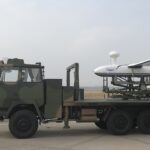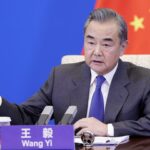Okinawa’s incumbent governor Denny Tamaki, the opposition-backed candidate who firmly opposes the relocation of a US military base on the southern island, won a second term in the prefecture’s gubernatorial election on Sunday.
The election result reflects local people’s unchanged repugnance for the heavy and prolonged US troop presence and the anxiety of being dragged into tensions across the Taiwan Straits, experts pointed out. They also said Tamaki’s victory can encumber the armament plan of Japan’s central government and US-Japan military layout.
Tamaki, backed by opposition parties, defeated Atsushi Sakima, the former mayor of Ginowan city who is backed by Prime Minister Fumio Kishida’s governing bloc. While Tamaki opposes moving US Marine Corps Air Station Futenma from Ginowan to the coastal area of Nago in Henoko, asking to close down the base and remove it from the island, Sakima supports the base’s relocation promoted by Japan’s central government.
“My commitment to resolve the US military base problem for the future of Okinawa has never been shaken,” said Tamaki, quoted in a report by TBS Television. Tamaki said as local people have struggled with noise, pollution, accidents and crime related to American troops because of the US bases, he will continue his endeavor to convey Okinawan’s will to the Japanese central government.
Tamaki told media in Naha that his reelection is the result of the unshakable will of local people, who have been dissatisfied for a long time with the heavy and prolonged US troop presence.
Local people are also increasingly worried about being dragged into possible conflicts across the Taiwan Straits due to the escalating tensions between China and the US caused by US house speaker Nancy Pelosi’s provocative visit to Taiwan island, Zhao Xiaozhuo, a research fellow at China’s Academy of Military Sciences, told the Global Times on Monday.
Zhao said the US will definitely use Okinawa if it decides to militarily interfere when a conflict breaks out in the Taiwan Straits as Okinawa is the nearest place to the Straits where the US has military bases.
Okinawa was under US occupation until it returned to Japan’s control in 1972. A majority of the 50,000 US troops based in Japan under a bilateral security pact and 70 percent of US military facilities are still in Okinawa, which accounts for only 0.6 percent of Japanese land.
In recent years, the Japanese government has also shifted its defense posture to southwestern Japan, Okinawa and its remote islands and is working to boost Japan’s military capability and budget in the name of countering “threats” from China, North Korea and Russia.
The situation in Okinawa will determine the level of the US-Japan alliance as many of Japan’s armament plans including increasing defensive capacity and developing military cooperation will be arranged in the island, Da Zhigang, director of the Institute of Northeast Asian Studies at Heilongjiang Provincial Academy of Social Sciences, told the Global Times on Monday.
The election result will affect Kishida’s security strategy as the elected anti-US base local government will continue to delay or hamper the central government’s policy related to the US bases in Okinawa, Xiang Haoyu, a research fellow at the China Institute of International Studies, told the Global Times on Monday.
“But local governments can hardly play a decisive role in diplomatic and military affairs, which makes it very difficult for Okinawa to fundamentally change Japan’s position in affairs related to the Taiwan Straits and Japan-US alliance,” Xiang noted.
(Global Times)




